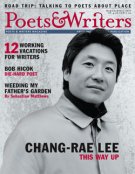In January, Chuck Palahniuk began teaching a free yearlong writers workshop that doesn't appear in the course listings for any college, university, or community arts center. Forget about academic credits—Palahniuk's workshop exists entirely online, at www.chuckpalahniuk.net.

Chuck's Workshop, as it is affectionately referred to on the Web site, offers essays and homework assignments written by Palahniuk, regular question-and-answer sessions, and a forum where writers can share their own writing and practice the formal techniques that the author applies in his best-selling novels Fight Club (Norton, 1996), Choke (Doubleday, 2001), Lullaby (Doubleday, 2002), and Diary (Doubleday, 2003). One essay and a corresponding assignment will be posted at the beginning of each month during the next year. The material is available for only 60 days after its initial appearance on the Web site.
Palahniuk plans to focus the essays on literary topics such as "establishing authority as a fiction writer," "researching the body of knowledge you need for a character," and "stealing the best aspects of screenwriting." Many will deal with the author's signature minimalism, a writing style he developed in the early 1990s in a community writers workshop taught by Portland novelist Tom Spanbauer, the author of The Man Who Fell in Love With the Moon (Atlantic Monthly Press, 1991) and In the City of Shy Hunters (Grove, 2002). The essays and homework assignments are "really designed to give people techniques they can use in their writing," says Palahniuk, "things that they can take home and apply immediately." He plans to use the essays he posts on the site as outlines for chapters of a nonfiction book on minimalism that he is currently writing. Doubleday will publish his next book in June, a collection of essays and journalism titled Stranger Than Fiction.
The initial idea for the workshop, which Palahniuk conceived with chuck palahniuk.net webmaster Dennis Widmyer, called for Palahniuk to give a lengthy critique of the best story posted to the Web site each month—determined by a voting system in which participants ranked each submission. But the author's proposed critiques were quickly abandoned as worries about intellectual property rights and lawsuits surfaced.
"I don't want to be put in the position where I read something and later someone accuses me of stealing their ideas," Palahniuk says. Instead, midmonth question-and-answer sessions were devised as a broader substitute for the individual critiques. Workshop participants post questions and Widmyer chooses the 10 most pertinent to Palahniuk's monthly essay. Palahniuk then responds to the questions as a way to keep participants active in the workshop. "I want it to be a place where people can go to air their work and receive constructive suggestions about how to improve it," Palahniuk says. "The stuff I'm putting out here would cost thousands of dollars to learn from an MFA program, if they even taught it at all," he says. Widmyer characterizes Palahniuk's motives as fundamentally egalitarian. "Chuck's one of those guys who didn't get started writing until later in life, and he basically used minimalism to find his style. He's just really humbled by this great method that he's learned and sees its potential for new writers. Instead of keeping it as his own private little thing, he's being open and candid about his method, letting everyone in on it."
Jeff Sartain is a freelance writer in Bloomington, Indiana.








